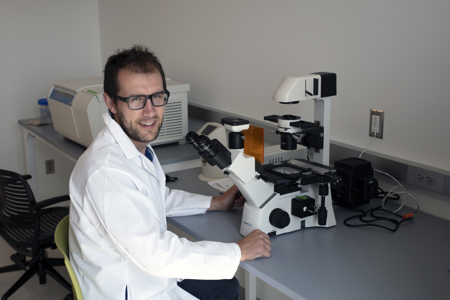Geoffroy Olivier Laumet
Associate Professor, Department of Physiology
Faculty, Neuroscience Program
Faculty, Cell & Molecular Biology Program
Professor, BioMolecular Science Gateway
Location: 5018 766 Service Rd Room 5018
Phone: 517-884-5057
Email: laumetge@msu.edu
Website: https://www.laumetpainlab.com/
CV: Download CV
Bio
### Research Interests Dr. Laumet’s lab interest is focused on understanding the communication between neurons and immune cells and how such communication contributes to the development and resolution of chronic pain. Neuro-immune interaction is a bidirectional communication; Immune cells secrete inflammatory mediators to influence neuronal physiology and neurons release neuropeptides and neurotransmitters that impact immune cell physiology. Increasing evidence indicate that non-neuronal cells (such as immune cells) critically contribute to the transition from acute to chronic pain. We are currently investigating the role of the immune system in the resolution of pain. Improving our understanding of how pain transitions from acute to chronic will facilitate the development of novel disease-modifying drugs. Thereby improve the quality of life of those who suffer from chronic pain. Today, it affects between 11%–40% of North Americans. Chronic pain drastically impacts the quality of life, is frequently associated with mood disorders and is an expensive public health condition. Our inability to manage chronic pain gave birth to the opioid crisis. Pain is an unpleasant sensory and emotional experience which is essential for our survival as it protects us or our body from injury. Pain is common in response to injury and in many pathological conditions. Usually, pain will resolve when the wound is healed or the disease cured. However, in a significant subset of patients, it fails to resolve and the patients develop chronic pain. Chronic pain is not simply a continuum of acute pain, the transition from acute to chronic pain requires persisting adaptations that govern the long-lasting plasticity of the nervous system. In our laboratory, we use mouse models to decipher the molecular and cellular mechanisms underlying the transition from acute to chronic pain. We model pain states induced by injury, surgery, cancer, inflammation, or chemotherapy treatment to investigate how these insults disturb the plasticity of the somatosensory system with a focus on two mechanisms: neuro-immune interactions and epigenetics. Experimental approaches. To address the contribution of neuro-immune interactions to chronic pain, we combine molecular, biochemistry, immunostaining, pharmacology, genetically modified mice, viral gene therapy, cell transfer and animal behavior in experimental models of chronic pain. We're looking for Graduate students and postdoctoral scientists to join the lab!
Courses
- NEU 492: Special Topics in Neuroscience
Selected Publications
- Head and Neck Cancer-derived small extracellular vesicles sensitize TRPV1+ neurons to mediate cancer pain View Publication
- Interleukin-10 resolves pain hypersensitivity induced by cisplatin by reversing sensory neuron hyperexcitability View Publication
- Istradefylline protects from cisplatin-induced nephrotoxicity and peripheral neuropathy while preserving cisplatin antitumor effects View Publication
- Mast cell-derived chymases are essential for the resolution of inflammatory pain in mice View Publication
- Neurotensin-expressing lateral hypothalamic neurons alleviate neuropathic and inflammatory pain via neurotensin receptor signaling View Publication
- Peripheral somatosensory neurons listen and orchestrate the immune response View Publication
- Upregulation of delta opioid receptor by meningeal interleukin-10 prevents relapsing pain View Publication
